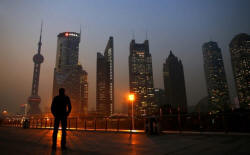U.S. companies in China mostly oppose tariffs, survey
shows
 Send a link to a friend
Send a link to a friend
 [July 12, 2018]
By John Ruwitch [July 12, 2018]
By John Ruwitch
SHANGHAI (Reuters) - Most U.S. businesses
operating in China oppose using tariffs as a weapon to solve their
problems ranging from market access to poor protection of intellectual
property rights, a survey suggested on Thursday.
Nearly 69 percent of the 434 respondents to the annual China Business
Climate Survey of the American Chamber of Commerce in Shanghai opposed
tariffs, while 8.5 percent backed them.
The survey, conducted April 10 to May 10, reflects the mix of concerns
and realities for American businesses in China at a time of heightened
uncertainty as the Trump administration raises the ante in its trade war
with Beijing.
President Donald Trump accuses China of unfair trade practices that
benefit its firms while hobbling U.S. companies and creating an outsized
trade deficit for the United States.
Washington raised the stakes in its trade war with China on Tuesday,
proposing 10 percent tariffs on an extra $200 billion worth of Chinese
imports, from food products to tobacco, chemicals, coal, steel and
aluminum.

"One should give the Trump administration credit for getting China's
attention because for many years there have been extended discussions
about market access issues that plague foreign companies here in China,
and the progress has been pretty slow," said Ken Jarrett, president of
AmCham in Shanghai.
However, extrapolating from the survey findings, Jarrett said
multilateral negotiations were a preferable approach.
"Now that the U.S. government has China's attention I think actually
there's no alternative but to try to go back to the negotiating table,"
said the former U.S. Consul General in Shanghai.
While U.S. firms still face challenges in China, 34 percent of
respondents felt state policies toward foreign firms had improved, up
from 28 percent last year, the survey showed.
Those that felt policies had worsened for foreign firms fell to 23
percent from 33 percent last year. Sixty percent said the regulatory
environment lacked transparency, on par with 2017.
Protection of intellectual property rights and licensing requirements
were the top two regulatory challenges.
The Trump administration has complained that U.S. companies are forced
to hand over key technology to access China's market.
[to top of second column] |

A man looks at the Pudong financial district of Shanghai November
20, 2013. REUTERS/Carlos Barria

Twenty-one percent of firms in the survey said they felt pressure to transfer
technology, with aerospace and chemicals firms leading the way at 44 percent and
41 percent respectively.
China's Cybersecurity Law, which took effect last year, had disrupted
businesses, the survey said, while VPN policies made work harder for 56 percent
of companies.
GUARDED OUTLOOK
While tariffs were not popular, 42 percent of respondents favored investment
reciprocity as a way to push for change in market access, up from 40 percent
last year.
However, those opposed to reciprocity grew to 16 percent from 9 percent last
year, and the number of unsure respondents slipped to 31 percent from 44
percent.
"Despite the relative optimism our members feel guarded about the future,"
AmCham said.
Concern about preferential treatment for Chinese firms and pressure for U.S.
technology transfers is "stoking demand for reciprocity in the U.S.-China
trading relationship, even if our members generally oppose the use of
retaliatory trade tariffs".
The biggest operational challenge was rising costs, an issue cited by 95 percent
of respondents. More than 85 percent said domestic competition was a challenge.
The proportion of companies expecting to be profitable in China was basically
flat at about 77 percent, the survey showed, but firms also signaled a slight
pullback in investment.

Fifty-three percent of firms increased investment in 2017, down from 55 percent
the year before, highlighting a trend of reduced investment growth since a 2012
peak, when 74 percent of respondents said they had boosted investment in China.
(Reporting by John Ruwitch; Editing by Clarence Fernandez and Darren Schuettler)
[© 2018 Thomson Reuters. All rights
reserved.] Copyright 2018 Reuters. All rights reserved. This material may not be published,
broadcast, rewritten or redistributed.
Thompson Reuters is solely responsible for this content. |